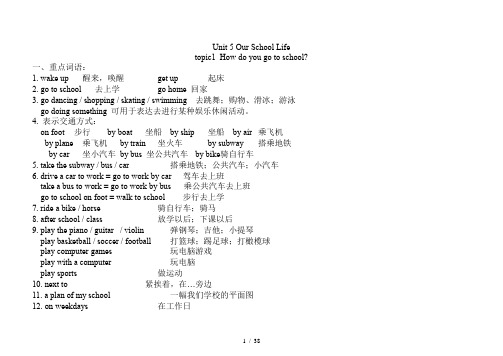仁爱七年级英语动词用法小结
仁爱英语七年级上册U4T3知识点

仁爱英语七年级上册U4T3知识点在仁爱英语七年级上册的第四单元第三课,我们学习了一些重要的知识点。
这些知识点是我们学好英语的基础,所以我们要认真学习和掌握。
下面是这些知识点的详细介绍。
1. 动词的时态
在英语中,动词的时态分为三种:现在时、过去时和将来时。
现在时表示现在正在进行或经常发生的事情;过去时表示过去已经发生过的事情;将来时则表示将来将要发生的事情。
我们要学会根据句子的语境和时态去使用正确的动词时态。
2. 数词的用法
数词在英语中有两种,分别是基数词和序数词。
基数词用于表示数量,而序数词则用于表示顺序。
我们要根据具体情况正确地使用这两种数词。
3. 形容词的比较级和最高级
形容词的比较级和最高级分别用于表示两个或多个事物之间的比较和最高程度。
比较级通常使用“-er”或“more”来构成,而最高级则使用“-est”或“most”来构成。
4. 祈使句的用法
祈使句用于表示请求、命令等,这种句子的语气比较强硬。
我们要熟练掌握祈使句的用法,根据具体情况正确地使用祈使句。
5. 代词的用法
代词是用来代替名词的,常见的代词有人称代词、指示代词和不定代词等。
我们要认真学习代词的用法,熟练掌握它们的用法和区别。
6. 物主代词的用法
物主代词是用来表示所属关系的,常见的物主代词有“my”、“your”、“his”、“her”等。
我们要认真学习物主代词的用法,熟练掌握它们的用法和区别。
以上就是本课的重点知识点,我们要认真学习和掌握。
只有强化基础,才能在英语学习的道路上越走越远。
仁爱版七年级下英语常用语法知识——动词知识点总结(含答案)

一、选择题1.The river runs_______ the city. And there are many beautiful bridges_______ the river. A.across; through B.through; overC.through; through D.across; over B解析:B【解析】试题分析:句意:这条河穿过城市。
而且河上有许多美丽的桥。
从内部穿过用through,在某物的垂直上方用over,根据分析可知答案,故选B。
考点:考查介词辨析。
2.I bought the tomatoes ________ the vegetable stall.A.at B.in C.on D.from A解析:A【解析】【分析】【详解】句意:我在蔬菜店买了西红柿。
考察地点介词。
at后跟小地点,in 后跟大地点,on 表示在….上面,from表示来自。
这里the vegetable stall 是一个小地点,所以前用介词at。
3.—What do you think of happiness, Zoe?—I think happiness is a way station too much and too little.A.among B.between C.opposite D.beyond B解析:B【解析】【分析】【详解】句意:——Zoe,你怎样看待幸福?——我认为幸福是介于太多和太少之间的一个中转站。
考查介词辨析。
A. among在…中间,指三者或三者以上的中间;B. between在…之间,在两者之间;C. opposite在…的对面;D. beyond超过、超越。
根据I think happiness is a way station too much and too little.可知句意为“我认为幸福是介于太多和太少之间的一个中转站。
”由后面的too much and too little,可知是介于两者之间,所以应用between,故答案选B。
仁爱版英语七年级下册重要知识点和语法点归纳总结

Unit 5 Our School Lifetopic1 How do you go to school?一、重点词语:1. wake up 醒来,唤醒get up 起床2. go to school 去上学go home 回家3. go dancing / shopping / skating / swimming 去跳舞;购物、滑冰;游泳go doing something 可用于表达去进行某种娱乐休闲活动。
4. 表示交通方式:on foot 步行by boat 坐船by ship 坐船by air 乘飞机by plane 乘飞机by train 坐火车by subway 搭乘地铁by car 坐小汽车by bus 坐公共汽车by bike 骑自行车5. take the subway / bus / car 搭乘地铁;公共汽车;小汽车6. drive a car to work = go to work by car 驾车去上班take a bus to work = go to work by bus 乘公共汽车去上班go to school on foot = walk to school 步行去上学7. ride a bike / horse 骑自行车;骑马8. after school / class 放学以后;下课以后9. play the piano / guitar / violin 弹钢琴;吉他;小提琴play basketball / soccer / football 打篮球;踢足球;打橄榄球play computer games 玩电脑游戏play with a computer 玩电脑play sports 做运动10. next to 紧挨着,在…旁边11. a plan of my school 一幅我们学校的平面图12. on weekdays 在工作日at weekends 在周末13. have breakfast / lunch / supper / dinner / meals吃早餐;中餐;晚餐;正餐;一日三餐have classes / lessons / a meeting 上课;上课;开会14. watch TV / movies / games / the animals 看电视;电影;比赛;动物read novels / newspapers / books 看小说;报纸;书15. wash one’s face/ clothes 洗脸;衣服16. 反义词:up – down, early – late 近义词:quickly – fastget up early 早起be late for 迟到17. the first / second / third / fourth day 第一;二;三;四天18. clean the house 打扫房子19. 表示建筑物(尤其学校建筑物):on the playground 在操场at school / home / table 在学校;家里;桌旁in a computer room / teachers’ office / classr oom building / gym / library / lab / canteen在电脑室;教师办公室;教学楼;体操馆;图书馆;实验室;食堂20. around six o’clock = at about six o’clock大约在六点21. 频率副词:never, seldom, sometimes, often, usually, always二、重点句型:1. It’s time to get up.该起床的时候了。
七年级仁爱英语必备知识点

七年级仁爱英语必备知识点在七年级学习英语时,掌握一些基础知识点非常重要。
以下是七年级仁爱英语学习中必备的知识点:一、动词时态英语中,动词时态指的是表示动作发生的时间的形式。
常见的时态有简单现在时、现在进行时、一般过去时、过去进行时和一般将来时。
下面是七年级学生必须掌握的动词时态:1. 简单现在时——表示现在正在进行的动作。
例句:I eat breakfast every morning.2. 现在进行时——表示现在正在进行的动作。
例句:She is watching TV at home.3. 一般过去时——表示过去发生的动作。
例句:He walked to school yesterday.4. 过去进行时——表示过去正在进行的动作。
例句:They were playing football at that time.5. 一般将来时——表示将来要发生的动作。
例句:I will study hard for the exam next week.二、名词名词是英语中最基本的词汇之一,表示人、地点、事物等。
在七年级学习英语时,必须掌握名词的分类和用法。
1. 可数名词和不可数名词可数名词是指可以分为单数和复数的名词,如book(书)和books(书籍)。
不可数名词是指无法分为单数和复数的名词,如milk(牛奶)和money(钱)。
2. 物质名词物质名词是指表示无法触摸或者无法看到的东西的名词,如water(水)和air(空气)。
3. 复合名词复合名词是由两个或更多的词组合而成的名词,如blackboard (黑板)和classroom(教室)。
三、形容词形容词是描述人、地点、事物等性质的词语,如happy(高兴)、beautiful(美丽)和tall(高)等。
在学习英语时,必须掌握形容词的比较级和最高级,并能够运用到具体的语境中。
1. 比较级和最高级形容词的比较级用于表达两个人或物之间的大小、高度、年龄等差别。
仁爱英语七年级语法总结1

Topic 11.询问交通方式用how。
如:How do you usually go to Chongqing?你通常怎样去重庆?回答常用:①by+交通工具名称。
如:by bus/subway/train乘公共汽车/地铁/火车by boat ship/sea坐船by plane/air/airplane乘飞机②in/on+冠词/形容词性物主代词/名同所有格十交通工具名称。
如:on a bus乘公共汽车in my car乘我的小汽车on Jim's bike骑吉姆的自行车He goes to Beijing on a train他乘火车去北京。
③on foot意为“步行”。
如:Xiao Hong goes to the park on foot小红步行去公园。
2. 频率副词英语中表频率的副词有:never(从不),seldom(很少),sometimes(有时),often(经常),usually(通常),always(总是),它们所表达的频率依次变大。
⑴频率副词在句中常放在be动词,情态动诃,助动词之后,实义动词之前。
如:She is always busy with her work.她总是忙于工作。
He often gets up at 6 in the morning 他经常早上六点钟起床。
⑵对频率副词提问用how often。
如:How often do you go to Chongqing? 你多久去一次重庆?I sometimes go to Chongqing我有时去重庆。
⑶How often意为“多久一次”,用来对频率提问。
用频度副词或单位时间内的次数来回。
如:three times a week,every day,often,seldom,always,never,sometimes,usually,every four weeks等。
-How often do you go swimming'?你多久游一次泳?-I go swimming four times a month.我一个月游四次。
仁爱英语七年级上册语法

仁爱英语七年级上册语法1.动词be(is,am,are)的用法我(I)用am, 你(you)用are,is跟着他(he),她(she),它(it)。
单数名词用is,复数名词全用are。
变否定,更容易,be后not加上去。
变疑问,往前提,句末问号莫丢弃。
还有一条须注意,句首大写莫忘记。
2.this,that和it用法(1)this和that是指示代词,it是人称代词。
(2)距离说话人近的人或物用this, 距离说话人远的人或物用that。
如:This is a flower. 这是一朵花。
(近处)That is a tree. 那是一棵树。
(远处)(3)放在一起的两样东西,先说this, 后说that。
如:This is a pen. That is a pencil. 这是一支钢笔。
那是一支铅笔。
(4)向别人介绍某人时说This is…, 不说That is…。
如:This is Helen. Helen, this is Tom. 这是海伦,海伦,这是汤姆。
(5)This is 不能缩写, 而That is可以缩写。
如:This is a bike. That’s a car. 这是一辆自行车。
那是一辆轿车。
(6)打电话时,介绍自己用this, 询问对方用that。
如:—Hello! Is that Miss Green? 喂,是格林小姐吗?—Yes, this is. Who’s that? 是的,我是,你是谁?注意:虽然汉语中使用“我”和“你”,但英语中打电话时绝不可以说:I am…, Are you…?/Who are you?(7)在回答this或that作主语的疑问句时, 要用it代替this或that。
如:①—Is this a notebook? 这是笔记本吗?—Yes, it is. 是的,它是。
②—What’s that? 那是什么?—It’s a kite. 是只风筝。
3.these和those用法this, that, these和those是指示代词,these是this的复数形式,指时间,距离较近的或下面要提到的人或事;those是that的复数形式,指时间、距离较远或前面已经提到过的人或事物。
仁爱版七年级上册语法知识点总结

仁爱版七年级上册语法知识点总结一、一般现在时。
1. 概念。
- 表示经常发生的动作或存在的状态。
例如:I often get up at six o'clock.(我经常在六点起床。
)- 表示客观事实或普遍真理。
例如:The earth goes around the sun.(地球绕着太阳转。
)2. 句子结构。
- 肯定句:- 主语 + be动词(am/is/are)+ 其他。
例如:He is a student.(他是一名学生。
)- 主语(非第三人称单数)+ 动词原形+ 其他。
例如:They play football every day.(他们每天踢足球。
)- 主语(第三人称单数)+ 动词第三人称单数形式+ 其他。
例如:She likes reading books.(她喜欢读书。
)- 否定句:- 主语 + be动词(am/is/are)+ not+ 其他。
例如:I am not a teacher.(我不是一名教师。
)- 主语(非第三人称单数)+ don't+ 动词原形+ 其他。
例如:They don't like apples.(他们不喜欢苹果。
)- 主语(第三人称单数)+ doesn't+ 动词原形+ 其他。
例如:He doesn't go to school on Sunday.(他星期天不去上学。
)- 一般疑问句:- Be动词(am/is/are)+ 主语 + 其他?例如:Are you a doctor?(你是一名医生吗?)- (非第三人称单数)Do+ 主语+ 动词原形+ 其他?例如:Do they play basketball?(他们打篮球吗?)- (第三人称单数)Does+ 主语+ 动词原形+ 其他?例如:Does she have a pen?(她有一支笔吗?)二、名词的单复数。
1. 规则变化。
- 一般情况加 -s。
例如:book - books,pen - pens。
仁爱版七年级上U2 T1语法总结 ,含实义动词的句型变化

2.Amy has big eyes 否定句为:Amy doesn't have big eyes 3.They have round faces否定句为: 否定句为:They don't have round faces
2.Amy has big eyes 一般疑问句为:Does Amy have big eyes?
肯定回答:Yes,she does.否定回答:No,she doesn't
3.They have round faces 一般疑问句为:Do they have round faces ?
肯定回答:Yes,they do.否定回答:No,they don't
含实义动词的句型变化 (以have/has为例)
汝州市第一初级中学 韩延锋
Amy
• a round face • a small nose • a long neck • a small mouth • small ears • big eyes • long hair
a round face a small nose a long neck a wide mouth big ears small eyes short hair
实义动词have/has
has是have的第三人称单数形式 • 单三主语(He/She/It/单人/单物)+has • 其他主语+have
Amy
1. He has short hair 2.Amy has big eyes 3.They have round faces 4.Amy and Jim have long necks
- 1、下载文档前请自行甄别文档内容的完整性,平台不提供额外的编辑、内容补充、找答案等附加服务。
- 2、"仅部分预览"的文档,不可在线预览部分如存在完整性等问题,可反馈申请退款(可完整预览的文档不适用该条件!)。
- 3、如文档侵犯您的权益,请联系客服反馈,我们会尽快为您处理(人工客服工作时间:9:00-18:30)。
七年级英语动词用法小结一、以下动词或词组后面用动词不定式,即todosomething1.wouldlike todosomething=wanttodosomething想要做某事2.hope/start/begin/nee dtodosomething希望/开始/需要做某事3.疑问词how+todosomething如何做某事4.beglad/nice/happy/sorry todosomething高兴/抱歉做某事5.Itisinteresting/fun todosomething.做某事很有趣。
6.Itistime todosomething.该做某事了7.Itistimeforsb.todosomething.该某人做某事了。
8.have(no)time todosomething(没)有时间做某事9.Ittakessb.sometime/money todosomething.花费某人一些时间/金钱做某事。
10.helpsb.(to)dosomething帮助某人做某事(注意:这里的to可以省略)11.seemto todosomething似乎要做某事实践运用:1.I’msorry(hear)thebadnews(坏消息).2.Thestudentsarehappy(see)eachotheragain.3.Theboyshavelittletime(practice)football.4.Isittimeforus(do)morningexercises5.Itistime(get)up.6.Itisinteresting(play)games.7.Ittakeshimhours(do)hishomework.8.Itisfun(draw)inthehills.9.Theyneed(have)arest.10.Canyouteachmehow(play)football11.Wouldyouandyourfamilylike(come)tovisitBeijingwithme12.Heoftenhelpshismother(clean)thehouse13.Thegirlwants(make)acardforhermother.14.Whattimedoyoustart(have)lessons15.I’dlike(talk)withyouaftersupper.16.Theboyseem(cry).17.Theboyisveryhappy___________(help)hismothercleanthehouseonSundays.18.Itisfinetoday.Wouldyoulike_________(enjoy)thesunshinewithme19.Ittakesheraboutanhour__________(help)themcleantheroom.20.It’stimeforme__________(have)anEnglishclass.21.Wouldyoulike__________(plant)somepotatoeswithme22.Doyouhavemuchtimecomputergames(play).23.It’s7:00o’clock.It’stime__________(get)up.24..Shewants___________(watch)TVwithhermothereveryday.25.Kittyhopes________(live)inWuxi.26.I’msorry.Ihavenotime_________(practise)Englishwithyou.二、以下动词或词组后面用doingsomething1.like/love/enjoy doingsomething喜欢做某事2.goshopping/swimming/running//walking/fishing/rollerskating去购物∕游泳∕跑步∕散步∕钓鱼∕滑旱冰3.gotothe dancing∕drawing∕swimming lesson去上舞蹈∕绘画∕游泳课4.dosome reading∕cleaning∕shopping∕washing读书∕打扫∕购物∕洗衣服5.介词后面跟doingsomething,如:how∕what about doingsomething做某事怎么样begood at doingsomething擅长做某事dowell in doingsomething擅长做某事after doingsomething做某事之后Thanksb.∕Thanks for doingsomething.感谢某人做某事。
6.practise doingsomething练习做某事7.haveagoodtime doingsomething∕havefun doingsomething做某事有乐趣8.spendtime∕money doingsomething花费时间∕金钱做某事9.doingsomething做某事作为主语时,如;Reading isfun.读书很快乐。
实践运用:1.Simonhasmuchtime(practice)(play)tennis.2.Sheoften(go)(skate).3.Thanksverymuchfor(help)me!Youareso(help).4.Weallenjoy(listen)tomusic.5.(do)morningexercises(be)goodforus.6.(play)basketball(help)us(get)strong.7.Mymotherspendstwohours(do)housework.8.don’tspendtoomuchtime(sit)infrontofthecomputer.9.Dotheyhavefun(visit)thefarm10.Whatabout(take)awalkwithme11.---Whoisgoodat(润)?---Jimis。
12.---Doyouoftengo(swim)insummer---Yes,wedo.13.Itmeans“No(smoke)”14.Howabout(meet)attheschoolgatetomorrow15.Jimgoestoschooleverydayafter(have)breakfast.16.Whataboutgoing______________(walk)aftersupper17.Weoftenpractise_____________(play)basketballatweekends.18.Wealwayshaveagoodtime______________(chat)withothers.19.Doesyoursonpractise__________(play)thepiano(钢琴)everyevening20.Myuncleenjoys__________(skate)buthelikesplayingchessbetter.21.Let’shaveacoke,andthengo__________(fish)somewherebytheriver.22.Weusuallygo________onSundays.(shop)23.DuanFanlikes(chat)withhisclassmatesontheInternet.24.Thereisa________(read)roomonthesecondfloorinthebuilding.25.Simongoes__________(swim)onSundays.26.Myparentsdon’tenjoy_________(swim)inthelake.27.Myfatherusuallydoessome_________(shop).三、以下情况用动词原形,即dosomething1.whynot+动词原形(dosomething)为什么不做某事2.letsb.+动词原形(dosomething)让某人做某事3.makesb.dosth.让某人做某事4.情态动词can∕must∕should∕may+动词原形(dosomething)5.祈使句中用动词原形,如:Millie,clean thedoorplease.6.在一般现在时中,当主语是第一、第二人称和第三人称复数时,行为动词使用其原形。
在其否定句中,使用don’t+动词原形;在其一般疑问句中,使用Do+主语+动词原形。
如:我的父母在周末看电影。
肯定句:Myparents watch filmsatweekends.否定句:Myparents don’twatch filmsatweekends.疑问句:Do yourparents watch atweekends我和Lucy在星期二下午经常踢足球。
肯定句:LucyangIoften play footballonTuesdayafternoon.否定句:LucyangI don’t often play footballonTuesdayafternoon.疑问句:Do Lucyangyouoften play footballonTuesdayafternoon学以致用:1.Itmakesme(feel)great.2.Letlucy(go)therenextweek.3.(notdo)itlikethat.4.JimandI_________(notbe)inthesameclass,butwearegoodfriends.5.Mykiteisinthetree.Canyou_________(climb)uptogetitforme6.Tom,_________(notdraw)onthewall,please.7.Ilikelisteningtomusic.Italwaysmakesme_________(feel)great.lie,__________(nottalk)inclass.9.Wecan__________(sing)manyEnglishsongsnow.10.Whynot_________inthelake(swim)11.Lilylikesreading,becauseitmakesher_________alotabouttheworld.(learn)12.MaryandI______(notbe)goodfriends.13..Simon,____________(notread)inthesun.It’sbadforyoureyes.14.Let’s_________(play)computergamestogether.15.Let’s_______(read)thewordsontheblackboard.16.__________thedoor,it’stoohot.(notclose)17.Howyou(go)toschooleverydayOnfoot.18.they(like)theWorldCup19.We___________(notwatch)TVonMonday.20.Whattheyoften(do)onSaturdays21.yourparents(read)newspaperseveryday四、以下情况动词用单数形式1.当主语是第三人称单数时,行为动词使用其第三人称单数形式;在其否定句中,行为动词使用doesn’t+动词原形;在其疑问句中,其用法为:Does+主语+动词原形如:Lucy经常课后说中文。
